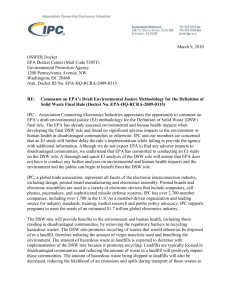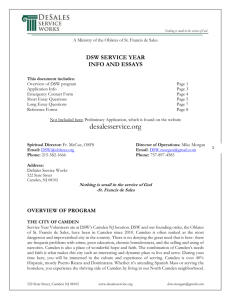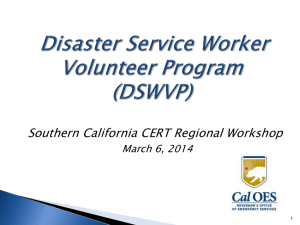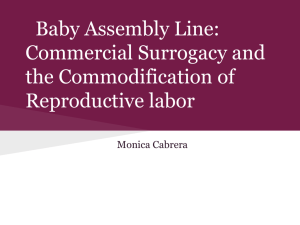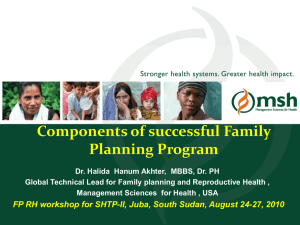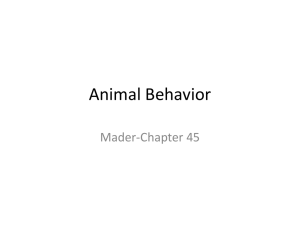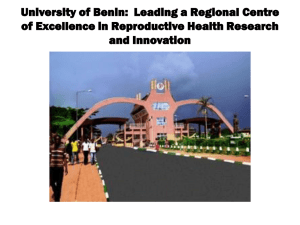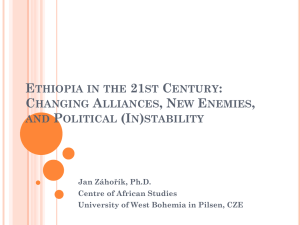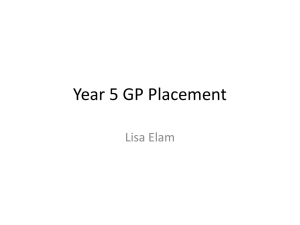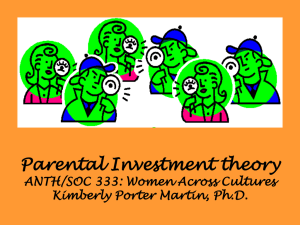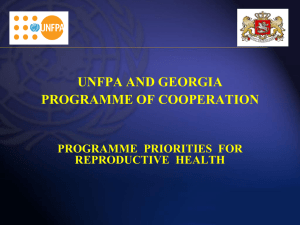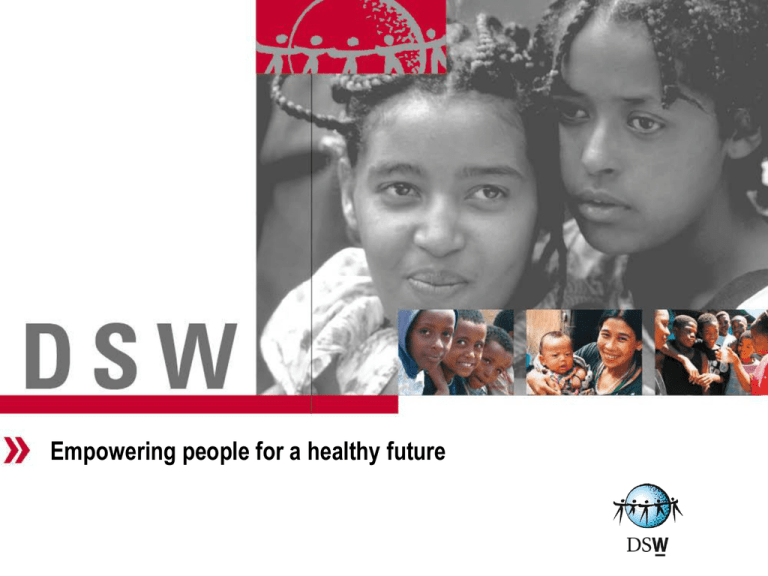
Empowering people for a healthy future
Responding to the contraception needs
and rights of young people
DSW’s Youth to Youth Program
The Case of Ethiopia
Tirsit Grishaw
»
www. www.dsw-online.org
© DSW – April 15
Outline of the Presentation
• Background about the Youth
• International declarations that promote
access to supplies
and services
• Reproductive rights Ethiopia signed and committed
• Dynamics of RH of the Youth
• DSW’s Y-2-Y program contribution to improve access to
supplies and services
• Concluding remarks
»
www. www.dsw-online.org
© DSW – April 15
Background about the Youth
• Young people aged 10-24 constitute 35% of the total
population in Ethiopia
• Young women still suffer high rates of maternal injury and
death due to childbirth without skilled assistance and
unsafe abortion.
• Persistent gender inequalities and traditional harmful
practices, including female genital mutilation (FGM) and
child marriage, in addition to limitted access to
contraception contribute to these significant health
challenges.
»
www. www.dsw-online.org
© DSW – April 15
Background about the Youth…….continued
• Among Ethiopia’s young women ages 20-24, the median
age at first sex is 16.2 years
• Young women and men have very little information and
access to Sexual and Reproductive Health information and
services compared to Adults ( 86% of adult women know
about contraceptives compared to 26 % of young women
aged 15-24)
•A
national survey taken over the past decade demonstrated
that the unmet need of adolescents is over two times higher
than that of the general population in the country.
»
www. www.dsw-online.org
© DSW – April 15
International declarations that promote access to
supplies and services
• ICPD at its core
promoted healthy, voluntary and safe
sexual and reproductive choices for individuals and couples,
including decisions on family size and timing of marriage.
• ICPD
adopted the goal of ensuring universal access to
reproductive health by 2015 as part of its framework for a
broad set of development objectives.
• The Millennium Declaration and Millennium Development
Goals set priorities that are closely related to the ICPD
goals
• Leaders ratified the understanding or importance of
attaining ICPD goals to achieve most of MDG goals in the
2005 World Submit.
»
www. www.dsw-online.org
© DSW – April 15
Reproductive rights Ethiopia signed and committed
Reproductive rights Ethiopia ratified as derived from
international human rights instruments specifically
includes the following core issues:
Rights to the highest attainable standard of health
including a right to have access to health care as well as
access to SRH services and information
Right for family planning: to decide on the number and
spacing of their children and to have access to
information and services to do so.
»
www. www.dsw-online.org
© DSW – April 15
Reproductive rights Ethiopia …… continued
Rights to the benefits of scientific progress: everyone
should have access to available technology in
reproductive healthcare, including quality contraceptive
options
Rights of adolescents and unmarried women to receive
SRH information and to freedom of thought : to have
access to family planning information and services
Rights to non-discrimination on the basis of age: young
people should have the same rights to confidentiality as
adults with regard to their reproductive healthcare.
»
www. www.dsw-online.org
© DSW – April 15
Dynamics of Reproductive Health of the Youth
• While the unmet need for contraceptive reduced to 34%
for the general population of Ethiopia, Young people’s
unmeet need remains twice bigger than the general
population.
• In a country like Ethiopia where the unmet need is very
high and source of funding for supply of contraceptives is
totally donor –dependent, ensuring contraceptive security
specifically for the most vulnerable groups such as
unmarried youth is very challenging
• Most Young people engage in sex at an early age: One in
six women aged 15-19 years already had their first child
and one fifth of this population is sexually active.
»
www. www.dsw-online.org
© DSW – April 15
Dynamics of Reproductive Health…. continued
• 45 percent of the total births in the country occur among
adolescent girls and young women, which highly expose
them to different reproductive health problems including
fistula
• According to the HIV sentinel surveillance of mothers
seeking antenatal care, HIV/AIDS prevalence is 11 percent
among women age 15-19, and 15 percent among those age
20-24
• Unintended pregnancy
and unsafe abortion is also very
high among teenage girls.
»
www. www.dsw-online.org
© DSW – April 15
DSW’s Y-2-Y program contribution to improve access to
RH services and supplies
DSW in Ethiopia has started to run a nation wide Youth to
Youth program since 2000
This comprehensive nation wide program with seven
components has two components that aim at improving the
access of the Youth to contraceptive and RH supplies and
services
Promoting behavioral changes among the youth regarding
their sexual and reproductive health
Through increasing awareness
through intensive education and communication
Capacity building – improving life skills, build young people
self esteem, improve their negotiation skill.
»
www. www.dsw-online.org
© DSW – April 15
DSW’s Y-2-Y program contribution to improve access to
supplies and services ……. continued
Improving
access to SRH services including contraceptive
supplies, VCT, provision of youth friendly services
Provide condoms and contraceptive supplies through social
marketing scheme
Train and deploy peer counselors
Provide hotline counseling through trained health
professionals
Provide youth friendly services through model clinics
Carry out outreach services
Facilitate referral linkages with public and private clinics
»
www. www.dsw-online.org
© DSW – April 15
DSW’s Y-2-Y program ….. continued
Provide condoms and contraceptive supplies through social
marketing scheme
DSW in collaboration with DKT introduced condom,
oral contraceptives and Sanitary Pad social
marketing
This scheme is found to be very useful to reach the
unreachable such as sex-workers, house maids,
married adolescent girls and others who have no
access to such commodities
Young marketers of the condom/Sanitary pad social
marketing scheme took the commodities to the
beneficiaries.
They also prepare events where young people could
come and get information and commodities with
affordable prices
Young marketers also visit
small shops . local bars,
small restaurants and hotels. They provide
information and the commodities at the right time
and place for the beneficiaries.
»
www. www.dsw-online.org
© DSW – April 15
DSW’s Y-2-Y program ….. continued
Train and deploy peer counselors
DSW through its well recognized youth
development training center train peer
councilors who are capable enough to
council their own peers
• The training is given using nationally
recognized peer counseling manual
• Young people prefer to divulge their issues
to their age mate than to adults, hence peer
counselors play vital role
• The peer counselors address young people problems via the youth clubs
• The counselors are well trained to address the problem of the youth either
by using model clinics and/or via facilitating referral arrangements
»
www. www.dsw-online.org
© DSW – April 15
DSW’s Y-2-Y program ….. continued
Provide hotline counseling through trained health professionals
• This strategy is very useful to increase
access of young people to SRH services and
information
• Hotline counselling is a toll free call that
could be made from any where to
professionals deployed to handle the calls
• Hotline is very convenient for young people
who are not willing to talk face to face
• The hotline counselling is undertaken by
male and female professionals who are
attached to the youth clubs. The youth
clubs through their mass edutainment
activities announce the numbers and
encourage young people to call and get the
necessary information and services
»
www. www.dsw-online.org
© DSW – April 15
DSW’s Y-2-Y program ….. continued
Provide youth friendly services through model clinics
• Model youth friendly clinics are also the
other important strategy that the Y-2-Y
program implemented to improve SRH
access to the youth
• Model youth friendly clinics are small clinics
mostly attached to the youth clubs. Due to
this fact, they become very important places
for the young people to come and get the
necessary services
• Model youth friendly clinics are extremely cost effective and efficient in
addressing youth SRH including contraceptive supplies and services
needs as they work very closely with the peer councillors
• Model youth friendly clinics are very suitable for rural and semi-urban
settings where health posts are very far from the community
»
www. www.dsw-online.org
© DSW – April 15
DSW’s Y-2-Y program ….. continued
Carry out outreach services
• Outreach is another strategy to reach
the most unreachable young girls,
married adolescent girls and young
women who face various constraints
to use the on the spot services
• Outreach services when accompanied
by necessary information bring
tremendous results mostly in rural
areas where most community live
more than 5 km away from health
centers
• This strategy is very good in creating
demand as well as providing supplies
close to the beneficiaries.
»
www. www.dsw-online.org
© DSW – April 15
DSW’s Y-2-Y program ….. continued
Facilitate referral linkages with public and private clinics
• The other important strategy of Y2-Y is facilitation referral services
to beneficiaries.
• Peer counselors after counseling
young people facilitate a referral
service for advanced services
• Peer counselors send beneficiaries
to health posts and or clinics
together with referral slip (voucher)
so that they could get the service
easily.
»
www. www.dsw-online.org
© DSW – April 15
Concluding remarks
• young people constitute one third of the total population.
All the efforts made to improve the wellbeing of the
society need to give special attention to this group
• Youth are diverse groups that should get various services
as per their categories such as sex, age, rural and urban
setting, in and out of school etc
• The current health facilities need to integrate youth
friendly RH services and provision of supplies
• Youth access to RH services and supplies very much
constrained by cultural, traditional and economic
situations.
• Addressing the RH
needs and rights of the youth
including supply of contraceptive contribute a lot to
sustainable growth of the country
»
www. www.dsw-online.org
© DSW – April 15
THANK YOU
»
www. www.dsw-online.org
© DSW – April 15

